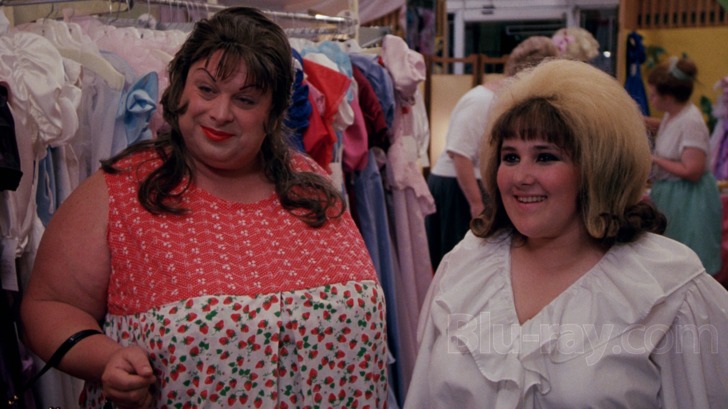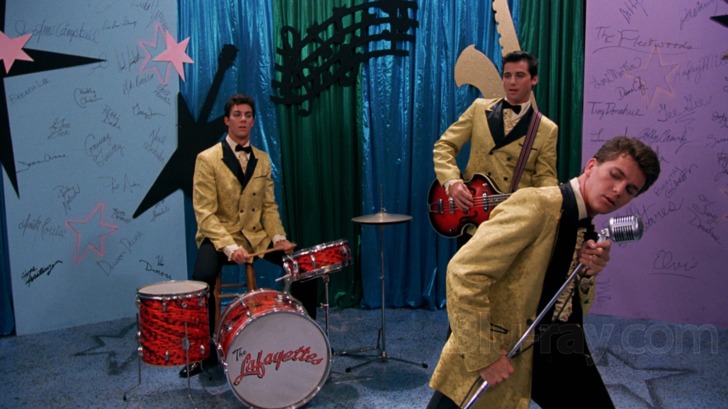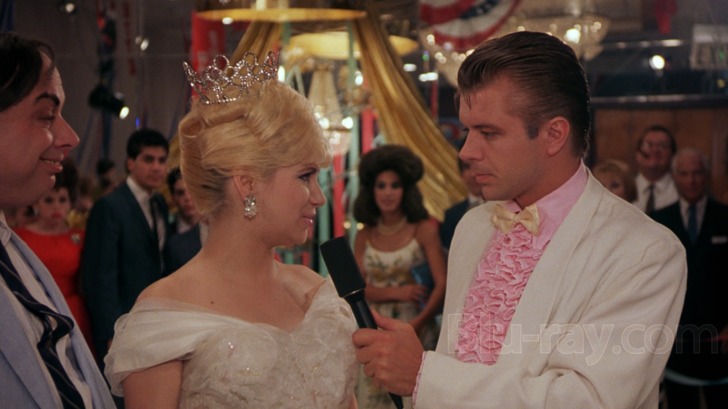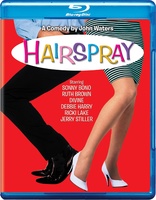Hairspray Blu-ray Movie
HomeHairspray Blu-ray Movie 
Warner Bros. | 1988 | 92 min | Rated PG | Mar 04, 2014Movie rating
7.2 | / 10 |
Blu-ray rating
| Users | 2.8 | |
| Reviewer | 4.0 | |
| Overall | 3.6 |
Overview
Hairspray (1988)
A 'pleasantly plump' teenager teaches 1962 Baltimore a thing or two about integration after landing a spot on a local TV dance show.
Starring: Sonny Bono, Ruth Brown, Divine, Debbie Harry, Ricki LakeDirector: John Waters (I)
| Comedy | Uncertain |
| Romance | Uncertain |
| Music | Uncertain |
Specifications
Video
Video codec: MPEG-4 AVC
Video resolution: 1080p
Aspect ratio: 1.78:1
Original aspect ratio: 1.85:1
Audio
English: DTS-HD Master Audio 5.1 (48kHz, 24-bit)
German: Dolby Digital 2.0
Italian: Dolby Digital 2.0
Spanish: Dolby Digital Mono (Spain)
Spanish: Dolby Digital Mono
Subtitles
English SDH, French, German SDH, Italian SDH, Spanish
Discs
25GB Blu-ray Disc
Single disc (1 BD)
Playback
Region free
Review
Rating summary
| Movie | 4.0 | |
| Video | 3.5 | |
| Audio | 4.0 | |
| Extras | 4.0 | |
| Overall | 4.0 |
Hairspray Blu-ray Movie Review
Back to the Salon
Reviewed by Michael Reuben March 5, 2014Hairspray was the first John Waters film to receive a PG rating. According to producer Rachel Talalay, Waters looked stricken when he first heard the news, because his reputation as the Pope of Trash hung in the balance. But Hairspray turned out to be one of Waters' most popular and enduring works. Part of the reason, as Talalay reassured Waters at the time, was that the film grew out of his own love for the Baltimore teenage scene in which he'd come of age. Audiences always respond to genuine feeling, even from the Pope of Trash. And it certainly didn't hurt when, in 2002, a splashy Broadway musical adaptation with songs by Marc Shaiman and Mark Wittman opened to rave reviews and huge box office. Five years later, a new film based on the musical was a bigger success than Waters' original. Several of Waters' films have retained their infamy, but nothing else in director's canon has shown the continued vitality of Hairspray. Looking back at Hairspray now, the notion of transforming it into a musical seems a foregone conclusion. Waters already made it one, except that, with one exception, he used existing songs, classics that he considered timeless and had been playing since he was a kid. The film is filled with dance numbers, and the emotions that flow through it are big and elemental—teenage emotions that can't be contained and have to find their expression in song. As is usually the case in films about teens, the enemies are the forces of repression and intolerance, which always lose out in the end (at least in fairy tales). The creators of the successful stage musical immediately latched onto those elements in Waters' film and amplified them, but they're just as enjoyable in the original today as when it first appeared in 1988.

Hairspray is set in 1962, which, as Waters notes in the extras, precedes the Beatles, the Vietnam War and pretty much everything that came to define "the Sixties". It's really more an extension of the Fifties. "It's the times. They are a-changin'. Something's blowing in the wind", says Edna Turnblad (Divine, in his last role), quoting two Bob Dylan songs. She's right, of course, though she really has no idea what's coming. In that era, every city has its own dance program, on which local high school kids can become celebrities. In Waters' native Baltimore, where all his films are set, it's The Corny Collins Show, hosted by young and handsome Corny Collins (Shawn Thompson). The current star couple are perky Amber von Tussle (Colleen Fitzpatrick) and Link Larkin (Michael St. Gerard), but things change quickly when plus-size Tracy Turnblad (Ricki Lake) auditions for the show and wows everyone with her fluid dance moves—especially Link, who is won over by Tracy's elegant steps and her sweet nature. None of this sits well with Amber, who takes after her social-climbing, viciously competitive parents, Velma and Franklin von Tussle (Debbie Harry of Blondie and the late Sonny Bono—Waters has always been a genius at getting unlikely people to appear in his films). Though initially skeptical of Tracy's interest, Edna becomes her daughter's biggest fan (and her agent) the minute she sees Tracy on TV. Her father, Wilbur (Jerry Stiller), has always believed in her. The essential story of Hairspray is Tracy's struggle for acceptance against all the hoity-toity elements in Baltimore that don't want to see a plump, lower-middle class girl win the annual competition sponsored by Corny Collins to be crowned Queen of the Auto Show. Amber von Tussle believes the crown to be hers by divine right. So do her parents, the principal of the high school (Jay Hillmer) and the head of Corny Collins' network, Arvin Hodgepile (Divine, in a second role). Tracy has to rely for support on her family and her best friend, Penny Pingleton (Leslie Ann Powers), whose frantically conservative mother is always chasing after her to declare that Penny is "permanently, positively, punished!" (Mrs. Pingleton is played by Joann Havrilla in a live-action cartoon whirl of a performance that is one of the film's highlights, especially when she has to track down her daughter in the African-American part of town, where she's terrified because every person she meets is black.) Paralleling Tracy's struggle is Hairspray's own version of the civil rights movement, which is the quest to integrate The Corny Collins Show. Currently the show allows black participants only on one day each month, which it calls "Negro Thursday". Typical of the era's open racism is a question asked during Tracy's interview for a permanent slot on the program: "Would you swim in an integrated swimming pool?" (The expected answer is "no", but Tracy answers "yes"). The irony is that many of the songs played by Corny Collins are by African-American artists, and one of his regular guests is Motormouth Maybelle (Ruth Brown), a black singer and DJ. When permanently punished Penny Pingleton falls for Maybelle's son, Seaweed (Clayton Prince), the town is even more scandalized, not to mention Mrs. Pingleton, who hires a maniacal psychiatrist (Waters, in a director cameo) to "deprogram" her daughter. But unlikely allies emerge from all sides, including Corny Collins himself and, briefly, a beatnik couple played by Ric Ocasek of The Cars and starlet/personality Pia Zadora. Through it all, there's music and dancing. The film generated a successful soundtrack album featuring one original song (the title track) and a collection of classics by such artists as Gene Pitney, The Flares, The Five Du-Tones, Little Peggy March and Toussaint McCall (who appears as himself). Other classics heard on the soundtrack include Gene Chandler's "Duke of Earl", Lesley Gore's "You Don't Own Me" and several songs by Chubby Checker. Hairspray is the equivalent of a period jukebox, made all the more memorable by the obvious joy with which Tracy Turnblad and the kids on Corny Collins' show (at least most of them) abandon themselves to its beat.
Hairspray Blu-ray Movie, Video Quality 

Cinematographer David Insley, who would reunite with Waters for Cry- Baby and would later work on another quintessential Baltimore story, The Wire, lit Hairspray to accentuate its candy-colored palette, which extends to The Corny Collins Show, the von Tussle household and even the Turnblad home. Warner/New Line's 1080p, AVC-encoded Blu-ray is a faithful representation of Insley's photography, with minor issues. The colors, contrast and black levels combine to create just the right degree of artificiality for the theatrical style that is Waters' signature. The detail of props, costumes and, most important, big hair is finely resolved, so that even in large crowds, individual faces and outfits can be distinguished. The chief weakness in the image is occasional video noise, which can be seen most readily on large flat surfaces. The establishing shot of the Tilted Acres amusement park at time mark 1:04:30 is a good example. It's possible that some of this is caused by excessive graininess in the original photography, but in general the grain pattern in Hairspray appears to be controlled and well-resolved. Some shots are on the soft side, but this appears to be source-based rather than a fault in the transfer. Fortunately, no attempt has been made to sharpen the image by digital means. At an average bitrate of 21.93 Mbps, Hairspray flirts with overcompression but manages to avoid visible artifacts, thanks to careful allocation of bandwidth between the dance scenes and the talky ones.
Hairspray Blu-ray Movie, Audio Quality 

Hairspray was released in "Ultrastereo", but the soundtrack was remixed for Dolby Digital 5.1 for the 2003 DVD release. The same mix has presumably been used for the Blu-ray, but it is now offered in lossless DTS-HD MA. As befits a film set in the early 1960s, the remix retains the film's original forward soundstage, but the 5.1 treatment allows the terrific vintage song selections more room to "breathe" and accentuates the frequent switches in sonic perspective between the live action in the TV studio and the viewers at home, who are listening through a tinny TV speaker. The songs themselves have greater clarity, wider dynamic range and tighter bass than most equipment of the era would have been capable of producing, which adds to the infectious charm of the soundtrack. Key sound effects in Hairspray are often exaggerated for comic effect, in the same way that the dialogue is often melodramatically overstated in quotation marks. The 5.1 remix doesn't pump up the effects beyond their intended purpose, but it brings them through with appropriate force (the riot scene late in the film is a good example). The dialogue is always clear, and the incidental underscoring by Kenny Vance (American Hot Wax) blends perfectly with the hit songs.
Hairspray Blu-ray Movie, Special Features and Extras 

The back cover of the Blu-ray gives only a hint of the wealth of extras. It lists "vintage interviews with John Waters, Ricki Lake and Divine", but there is much more. I do not have New Line's 2003 DVD for comparison, but according to an owner of that disc, the only extras on it were a commentary and trailer, which have been included here. The rest of the extras appear to have been taken from the bonus disc included with the Ultimate John Waters Collection released by New Line in 2004.
- Commentary with Writer/Director John Waters and Actor Ricki Lake: First appearing on New Line's 2003 DVD of Hairspray, this commentary was recorded separately by Waters and Lake, with their remarks subsequently edited together. (Waters refers at one point to his latest film, Cecil B. Demented, which was released in 2000.) Waters is a font of historical detail on the film's period and setting, which reflects his own youth, and he describes his casting process, as well as the cast's subsequent careers. Lake recalls the shock of being plucked from obscurity and the sudden realization, upon seeing the finished film, that she was the star. Her comments and Waters' have been smartly overlapped so that their recollections of the same incident are often juxtaposed, e.g., the infamous deleted scene in which Tracy Turnblad discovers cockroaches in her hair (which survives in the film only as a rumor started by Amber).
- Get to Know . . . (480i; 1.33:1; 6:12): This 1987 interview with Waters by local reporter Denise Koch ran on WJZ-TV, Baltimore.
- Vincent Peranio: Hairspray's Production Design (480i; 1.33:1; 4:06): Hairspray's production designer reviews and explains his drawings for the film's sets, including some that were never built.
- Rachel Talalay: Producing Hairspray (480i; 1.78:1, enhanced; 4:07): Hairspray was Waters' first film with any kind of studio backing. A former PA on Polyester, Talalay was now a New Line executive. In this 1988 interview, she describes stepping into the producer's role.
- Original Hairspray Featurette (480i; 1.33:1; 6:40): A 1988 EPK, hosted by Waters. Interviewees include Debbie Harry, Ricki Lake, Jerry Stiller, Divine, Sonny Bono and Ruth Brown.
- Two of the Original Buddy Deaners: Linda and Gene Snyder (480i; 1.78:1, enhanced; 2:37): Hairspray's "Corny Collins Show" was based on The Buddy Deane Show in Baltimore. Linda and Gene Snyder met as regular dancers on that show.
- Dennis Dermody, Sue Lowe and Brook Yeaton: Divine In Memoriam (480i; 1.78:1, enhanced; 8:26): Divine died of respiratory failure at the age of 42 just a month after the release of Hairspray. Two friends and his godson share their memories.
- Sue Lowe, Peter Koper and Dennis Dermody: A Portrait of Cookie Mueller (480i; 1.78:1, enhanced; 13:23): Cookie Mueller was a regular in Waters' early films and part of his extended circle. She died in 1989 at age 40 of AIDS-related causes. Three of her friends tell stories of her adventures.
- Bob Adams on the Dreamlanders: Close Circle of Friends (480i; 1.78:1, enhanced; 1:56): The "Dreamlanders" is the nickname given to Waters' inner circle. Adams has appeared in Pink Flamingos, Female Trouble and A Dirty Shame.
- Dennis Dermody: Seasons Greetings, Love John . . . (480i; 1.78:1, enhanced; 3:12): Interviewed in 1993, Dermody reviews his collection of Waters' personalized Christmas cards and invitations.
- Rikki Lake: A Hairspray Reunion (480i; 1.33:1; 4:16): On an April 12, 1994 episode of her TV talk show, Ricki Lake hosts a reunion with Waters and costars Jerry Stiller and Ruth Brown. Michael St. Gerard joins them on the phone from Toronto.
- Audio: These audio-only clips are excerpts from an interview-style conversation between Waters and Divine.
- Elton John (4:54)
- Grass + Murder (5:24)
- LSD (0:19)
- Punks (0:47)
- Foreign Travel (0:36)
- Strengths (1:34)
- On Being Divine (1:20)
- Showbiz (1:50)
- Theatrical Trailer (480i; 1.85:1, enhanced; 2:23).
Hairspray Blu-ray Movie, Overall Score and Recommendation 

John Waters is an acquired taste for most, and I would discourage anyone unfamiliar with Hairspray from a blind buy. Even those who know only the 2007 film of the musical, starring John Travolta, should think twice before assuming they know what they're getting with Waters' original. The original Pope of Trash a/k/a the Prince of Puke can still be glimpsed from time to time, even with a PG rating (e.g., the scene where Velma von Tussle assists her daughter with teenage complexion issues). For Waters fans, though, the Blu-ray of Hairspray should be a satisfying experience.
Similar titles
Similar titles you might also like

Hairspray
2-Disc Shake and Shimmy Edition
2007

Girls Just Want to Have Fun
1985

Straight Talk
1992

Second Act
2018

The Prince & Me 2: The Royal Wedding
2006

Isn't It Romantic
2019

Music and Lyrics
2007

Pitch Perfect 4K
2012

She's All That
1999

Coyote Ugly
The Double-Shot Edition
2000

Pirate Radio
The Boat That Rocked
2009

Pitch Perfect 2 4K
2015

Life Stinks
1991

Shall We Dance?
2004

That Funny Feeling
1965

Magic Mike 4K
2012

Blast from the Past
1999

13 Going on 30
2004

Mamma Mia! 4K
10th Anniversary Edition
2008

House Party 4K
1990
